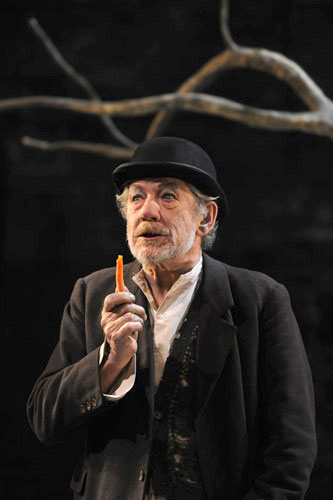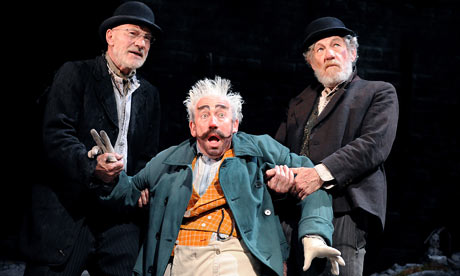
by Samuel Beckett
I think it is impossible not to approach
Waiting for Godot without some baggage.
It was famously the start of modernist British theatre (first performed in France,
but I
don't know if it had the same reaction over there - I suspect not), made Peter
Hall's name and has been the but of anti-intellectual jokes ever since. One
reviewer described it as a play where 'nothing happens - twice'! My own baggage
includes attempting to play Estragon at school and staring hopelessly at the
banal words, repeated endlessly - Why can't we go? Because we're waiting...
waiting for Godot. My other desperate memory was seeing a version in Kingston in
the 80s which was so desperately bad it seemed to last a lifetime. This is a
play which it is very, very easy to do badly.

So why not get some of the greatest actors of their generation to do it? And give it a touch of context. Rather than just two tramps in a nowhere land, Vladimir and Estragon are here two old performers, haunting the ruins of a desolate theatre. This was described on a Radio 4 review I heard as 'desperately obvious.' Well, it worked for me.
I am not a Patrick Stewart fan. I have seen him in the West End on a number of
occasions, and he always plays Patrick Stewart very well. As Vladimir - arguably
the only real character in the play -
his solid Stewartish presence is a great anchor. His desperate
attempts at authority, which break down at the touch of a butterfly wing are as
endearing as they are desperate. Ian McKellan acts him off the stage of course,
but Stewart is good enough to be not entirely overshadowed by his co-star. The
shambling, broken, alcoholic Estragon is a masterpiece and if he doesn't win
every theatrical award this year something has gone very wrong. He is pathetic,
whining, wheedling, forgetful and, just occasionally grateful. Everything about
his character is perfect. It should be said that as a duo, he and Stewart are
quite brilliant. At times their timing is completely Morcombe and Wise, they
finish each other's sentences but also each others movements. If they play it
for laughs rather than the voiding melancholy more often seen, it does allow the
audience time to understand.
The relief, comic or otherwise, is provided by a wildly over the top Simon Callow as Pozzo and the mute Ronald Pickup as Lucky. Callow is hysterically funny in Act 1, and milks his part shamelessly for laughs utilising amazing expressions and old fashioned clowning. He makes sitting down an complete tour de force. Lucky has one speech - but what a speech. His rambling demented philosophical lecture is delivered with insane intensity and eye-rolling self-importance. The return of these diversionary characters in Act 2 is a shock. In the intervening day they have unravelled completely causing Vladimir, and the audience, to question their own belief about the world he inhabits.
For the student of Beckett this production is played too much for laughs. The aching, mournful silences are not there. We hear the busking duo of old raconteurs rather than the existential messages, they are not given time to feel the pain of time passing - or not passing. The play is about desperation, loneliness, of an empty life without God to give it meaning. It is about people who regard suicide as a pleasant diversion to look forward to. Our philosophical colleague described it as existential nihilism, and that sums it up. The problem with Godot as written is that it is too painful to watch, too difficult to sit through, to horrendous to contemplate. So a bit of humour, a bit of soft shoe shuffle helps us to get through the allotted time ourselves. This underplaying of the silence does, in the end, allow us to see the play for what it is - a scream for meaning and purpose, a cry from a cold war era which can't work out the point of it all.
This is a fine production.